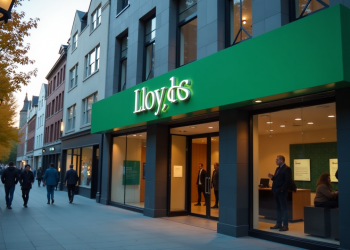A brutal rotation out of big tech sent a shockwave from Wall Street across the Pacific, setting Asian markets up for a sluggish and anxious start to the day.
The Nasdaq 100 suffered its sharpest drop since the tariff shocks of April, a clear sign that investor nerves are fraying as a pivotal speech from Federal Reserve Chair Jerome Powell looms at the end of the week.
Equity futures in Tokyo and Hong Kong flashed red after the US session, where a 3.5% slide in chip giant Nvidia Corp. dragged the entire megacap tech sector lower.
This tremor of fear has left investors questioning the durability of a rally that many now believe has gone too far, too fast.
“Wall Street finally hit an air pocket overnight as the US summer lull thins liquidity and weakens the bid for risk assets, especially high flying tech stocks,” wrote Kyle Rodda, a senior market analyst at Capital.com.
There’s also a degree of trepidation heading into the Jackson Hole symposium.
The bubble debate: a market priced to perfection?
That trepidation is rooted in a growing concern that the market’s longtime leaders are dangerously overvalued.
Strategists at Bank of America Corp., led by Michael Hartnett, have repeatedly warned of a “bubble risk” in US shares, arguing the spectacular rally in the so-called Magnificent Seven stocks looks “stretched.”
This sentiment captures a market that has become a victim of its own success.
“It is difficult to poke holes in the bull case; the path of least resistance is likely higher, but we find ourselves increasingly worried that traditional risk assets (stocks and bonds) appear priced to perfection,” said Nicholas Bohnsack at Strategas.
That perfection will be put to the supreme test on Friday.
The Fed’s tightrope walk in Jackson Hole
The entire market is now holding its breath for Powell’s speech.
While traders have aggressively priced in a quarter-point rate cut for September as a virtual certainty, a recent spike in wholesale inflation has given the central bank pause.
Investors are desperate to see if Powell will affirm their dovish bets or, as some fear, throw cold water on the rally by reminding them that the fight against inflation is not over.
“We’ll argue that the biggest risk for Treasuries is if the Fed chief chooses to throw cold water on the widely anticipated September rate cut,” warned Ian Lyngen at BMO Capital Markets, as quoted by Boomberg.
Even President Donald Trump weighed in, reiterating his criticism of Powell and posting on Truth Social that “every sign is pointing to a major rate cut.”
A reality check for Dalal Street
This wave of global uncertainty has finally broken the bullish spell on Dalal Street. After a four-day winning streak, the Indian stock market was poised for a lower open, with the Gift Nifty signaling a negative start.
At the bell, the Sensex opened 108.54 points (0.15%) lower to 81,524.39, while the Nifty fell 37.65 points (0.15%) to 24,943.00.
The retreat comes as geopolitical tensions also simmer, with the US stepping up scrutiny of Chinese imports and Treasury Secretary Scott Bessent targeting India over its purchase of Russian oil. It is a stark reminder that even in a bull market, risks are never far from the surface.
The post Asian markets open: Nikkei slides, Sensex down 0.15% after Wall Street tech wreck appeared first on Invezz









